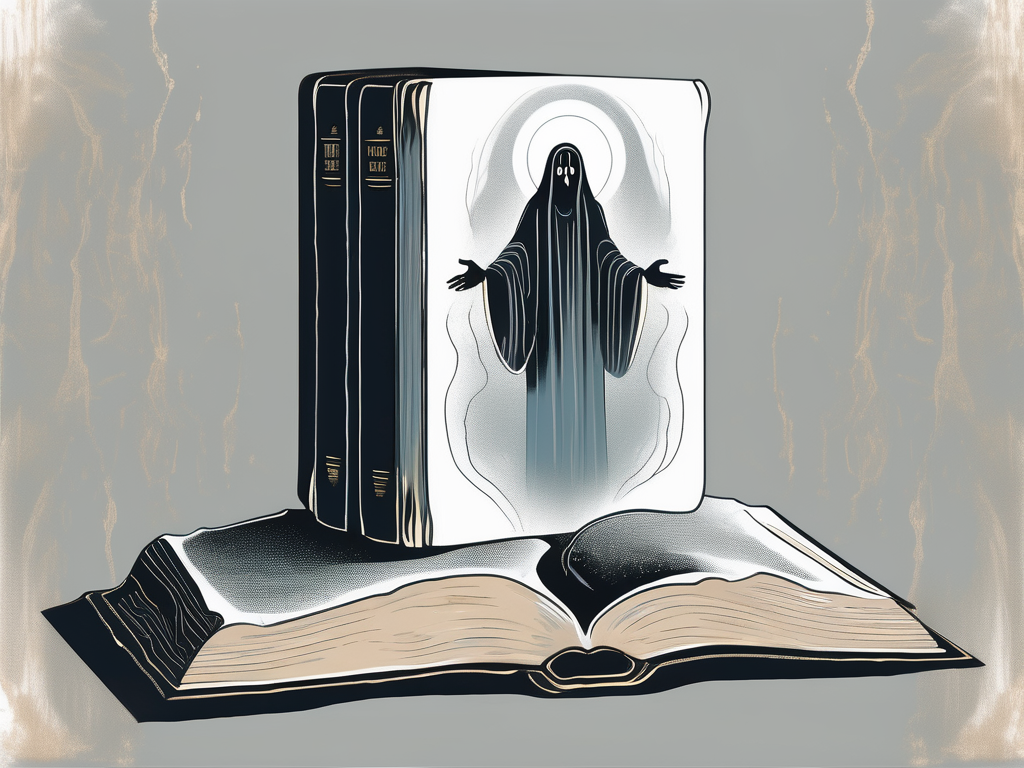Death is a universal experience that touches all of our lives. It’s a subject that has captured the attention of theologians, scholars, and believers throughout the centuries. But what exactly does the Bible say about remembering the dead? Let’s explore this topic together and delve into the rich teachings of scripture.
Understanding the Concept of Death in the Bible
Before we dive into specific verses and teachings, let’s take a moment to understand how death is viewed in the Bible. In the Old Testament, death is seen as a natural part of life, while in the New Testament, it takes on a deeper meaning in the context of Christ’s sacrifice and resurrection.
Old Testament Perspectives on Death
In the Old Testament, death is portrayed as a part of the human experience. From the story of Adam and Eve’s expulsion from the Garden of Eden to the psalms of lamentation, we see a recognition of the inevitable end that awaits each one of us. The book of Ecclesiastes, for example, reflects on the fleeting nature of life and the certainty of death. It reminds us that “to everything there is a season, a time to be born and a time to die” (Ecclesiastes 3:2).
Yet, alongside this acknowledgement, the Bible also offers a message of hope and the promise of eternal life. In the book of Job, despite his suffering and loss, Job declares, “I know that my Redeemer lives, and He shall stand at last on the earth; and after my skin is destroyed, this I know, that in my flesh I shall see God” (Job 19:25-26). This verse speaks to the belief in resurrection and the hope of life beyond death.
New Testament Views on Mortality
The New Testament provides a transformative perspective on death through the life, death, and resurrection of Jesus Christ. As followers of Christ, we have the assurance of eternal life through faith in Him. The apostle Paul writes in his letter to the Corinthians, “For as in Adam all die, even so in Christ all shall be made alive” (1 Corinthians 15:22).
This transformative view of death helps shape our understanding of how we remember and honor those who have passed away. In the early Christian community, death was not seen as an end, but rather a transition to a new and glorious existence with God. This belief is beautifully expressed in Paul’s letter to the Philippians, where he writes, “For to me, to live is Christ, and to die is gain” (Philippians 1:21).
Furthermore, the New Testament teaches us that through Christ’s resurrection, He conquered death and opened the way to eternal life for all who believe in Him. Jesus Himself said, “I am the resurrection and the life. He who believes in Me, though he may die, he shall live” (John 11:25). This profound statement reassures us that death is not the end, but rather a gateway to a glorious and everlasting existence in the presence of God.
In conclusion, the Bible offers a multi-faceted understanding of death. In the Old Testament, death is acknowledged as a natural part of life, while the New Testament brings a transformative perspective through Christ’s sacrifice and resurrection. These teachings provide hope, comfort, and the assurance of eternal life for all who believe.
Biblical Verses on Remembering the Dead
When it comes to remembering the dead, the Bible offers many verses and teachings that guide our thoughts and actions. Let’s explore a few of them:
Verses from the Psalms
The book of Psalms is a rich source of comfort and reflection when dealing with the loss of loved ones. Psalm 23, for example, paints a vivid picture of God’s presence and guidance, even in the darkest valleys of life. It reminds us that even in our grief, God is with us, leading us and providing us with comfort and strength.
In Psalm 116, we find solace in the assurance that God is compassionate and attentive to our cries in times of sorrow. It reminds us that we are not alone in our grief, and that God hears our prayers and offers us comfort and healing.
Furthermore, Psalm 121 reminds us that our help comes from the Lord, the maker of heaven and earth. It reassures us that even in the face of loss and death, God is our constant source of strength and support. We can find peace and hope in knowing that God is watching over us and will never leave us.
Teachings from the Gospels
The Gospels, particularly the accounts of Jesus’ life, offer profound insights into how we remember and honor the dead. In the story of Lazarus’ resurrection, we see Jesus demonstrating compassion for the grieving and the power of resurrection. This story reminds us that Jesus understands our pain and sorrow, and He has the power to bring life out of death. It teaches us to hold on to hope even in the face of loss, knowing that God has the final say.
Jesus’ own crucifixion and resurrection serve as the ultimate example of hope and victory over death. Through His sacrifice, Jesus conquered death and offers us the promise of eternal life. This teaches us that death is not the end, but a transition into a glorious eternity with God. It gives us comfort and assurance that our loved ones who have passed away are in the loving presence of God, experiencing true joy and peace.
Additionally, Jesus’ teachings on love and compassion remind us of the importance of remembering the dead with kindness and respect. He encourages us to honor their memory by living lives of love and service, just as He did. By extending love and compassion to others, we keep the memory of our loved ones alive and honor their legacy.
In conclusion, the Bible offers a wealth of verses and teachings on remembering the dead. Through the Psalms, we find comfort and assurance of God’s presence and compassion. In the Gospels, we discover the power of resurrection and the hope of eternal life through Jesus’ own sacrifice. These teachings guide us in honoring the memory of our loved ones and living lives that reflect their love and legacy.
The Role of Memory in Mourning
Memory is a powerful tool that helps us navigate the complexities of grief and loss. In the Bible, we find guidance on the importance of remembrance and how it can aid us in the healing process.
In times of mourning, memories become precious treasures that allow us to keep the presence of our loved ones alive in our hearts. They serve as a bridge between the past and the present, connecting us to the moments we shared and the impact they had on our lives. Memories bring comfort and solace, reminding us of the love, joy, and lessons we experienced together.
When we remember the dead, we honor their lives and the legacy they left behind. Each memory becomes a tribute, a way to celebrate the unique qualities and contributions of the departed. It is through remembrance that we find solace and strength to carry on, knowing that their impact continues to shape our lives.
The Importance of Remembrance
Remembering the dead allows us to honor their lives and the impact they had on us. It helps us cherish the memories and the lessons they left behind. Additionally, remembrance can also serve as a source of comfort and hope as we reflect on the promises of the Bible.
As we recall the memories of our loved ones, we are reminded of the love and support they provided. Their words of wisdom, acts of kindness, and shared experiences become a source of strength during difficult times. Through remembrance, we find solace in knowing that their love continues to surround us, even in their physical absence.
Furthermore, remembrance can also offer hope in the face of grief. The Bible assures us of the eternal promises of God, providing comfort that we will be reunited with our loved ones in the heavenly realm. This hope sustains us and gives us the courage to face the pain of loss, knowing that it is not the end but a temporary separation.
Biblical Guidance on Grief and Loss
The Bible offers a myriad of stories and teachings that address grief and loss. Through figures like Job, who experienced immense suffering, we learn about the raw emotions and questions that arise in times of mourning. We are reminded that we are not alone in our grief and that God is present to comfort and heal us.
Job’s story teaches us that it is natural to question and wrestle with God in times of loss. It is through this process that we can find solace and understanding, as Job did when he encountered God’s presence and received comfort. The Bible assures us that God is near to the brokenhearted and that He understands our pain.
Moreover, the Bible offers words of comfort and encouragement to those who mourn. In the book of Psalms, we find expressions of grief, lament, and hope. These psalms remind us that it is okay to pour out our emotions before God and seek His comfort. They assure us that God is our refuge and strength, a present help in times of trouble.
Through biblical guidance, we are reminded that grief is a natural and necessary part of the human experience. It is a process that requires time, patience, and support. The Bible offers us a roadmap for navigating the complexities of grief, providing solace, hope, and the assurance that we are not alone in our journey.
Commemorating the Dead: Biblical Practices
Throughout history, various religious and cultural practices have emerged to commemorate the dead. Let’s explore how these practices align with biblical teachings.
Ancient Jewish Traditions
Judaism has a rich tradition of honoring and remembering the departed. Practices such as lighting memorial candles, reciting the Kaddish prayer, and observing Yahrzeit all serve as tangible ways to remember and honor the dead. These practices draw upon the teachings of the Torah and the importance of communal remembrance.
Lighting memorial candles is a significant practice in Jewish culture. It symbolizes the eternal flame and serves as a reminder of the soul’s eternal presence. The act of lighting the candle is often accompanied by reciting prayers and reflecting on the memories of the departed loved ones.
Reciting the Kaddish prayer is another essential aspect of Jewish mourning rituals. This prayer, traditionally recited by close family members, praises and glorifies God while also expressing the hope for peace and eternal rest for the deceased. The Kaddish prayer is a powerful way to remember and honor the dead while seeking solace and comfort in the divine presence.
Observing Yahrzeit is yet another significant practice in Judaism. Yahrzeit, meaning “anniversary” in Yiddish, is the annual commemoration of a loved one’s passing. On this day, family members often attend synagogue services, light candles, and recite prayers to honor the memory of the deceased. It is a time of reflection, remembrance, and connecting with the community to find support and comfort.
Christian Rituals and Their Biblical Roots
Christianity also embraces specific rituals to commemorate the dead. Whether it’s holding funerals, observing All Saints’ Day, or participating in the Lord’s Supper, Christians find solace and comfort in these practices. These rituals find their roots in biblical teachings and the actions of Jesus, showing the importance of remembrance in the Christian faith.
Funerals hold a significant place in Christian tradition. They provide an opportunity for family and friends to gather, mourn, and celebrate the life of the departed. The funeral service often includes scripture readings, prayers, hymns, and eulogies that offer comfort, hope, and a reminder of the deceased’s faith and the promise of eternal life.
All Saints’ Day, observed on November 1st, is a Christian holiday that honors all saints and martyrs, known and unknown. It is a day to remember and celebrate the faithful departed who have attained heaven. Christians attend special church services, light candles, and offer prayers to honor the memory of these saints and seek their intercession.
The Lord’s Supper, also known as Communion or the Eucharist, is a central sacrament in Christianity. It commemorates the Last Supper of Jesus with his disciples, where he shared bread and wine, symbolizing his body and blood. Participating in the Lord’s Supper is a way for Christians to remember Jesus’ sacrifice and express their faith in his resurrection and the promise of eternal life.
These rituals and practices not only provide comfort and solace to the bereaved but also serve as reminders of the biblical teachings on life, death, and the hope of resurrection. They offer a sense of community, support, and the assurance that the memory of the departed will be cherished and honored for generations to come.
Theological Interpretations of Remembering the Dead
As with any topic, different theological interpretations and viewpoints exist regarding remembering the dead. Let’s explore some of these perspectives and the debates that continue to shape our understanding.
Different Christian Denominations’ Views
Within Christianity, different denominations hold varying beliefs and practices concerning remembering the dead. Some place a greater emphasis on intercession for the departed, while others focus on the community’s role in memorial services. These differences in theological interpretation highlight the diverse ways communities remember and honor their loved ones.
Scholarly Interpretations and Debates
Beyond denominational differences, scholars and theologians engage in ongoing debates and discussions on various aspects of remembering the dead. Some focus on the historical context of certain biblical passages, seeking to unveil their intended meanings. Others dive into the theological implications of remembrance and its significance in our relationship with God and one another.
In Conclusion
Remembering the dead is a deeply personal and spiritual practice for many believers. The Bible offers guidance and teachings on death, remembrance, and the hope of eternal life in Christ. As we explore these topics, may we find comfort, healing, and inspiration in God’s word as we remember and honor those who have passed away.












